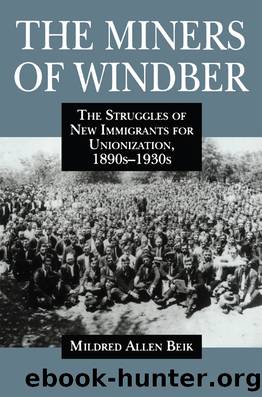The Miners of Windber by Mildred Beik

Author:Mildred Beik [Beik, Mildred]
Language: eng
Format: epub
Tags: Technology & Engineering, Mining
ISBN: 9780271029900
Google: fteQsXRTcVoC
Publisher: Penn State Press
Published: 2006-06-15T02:54:55+00:00
9
* * *
Rising Expectations
World War I is often considered a turning point in American history because it produced major social, political, and economic changes in American life. Such changes deeply affected the lives of Windber miners and their families.
Changes in immigration, immigration policy, and the attitudes of the American-born toward new immigrants could not but affect a large foreign-born population and their descendants. The outbreak of war in August 1914 led to the cessation or sharp curtailment of immigration, which in turn led to a labor shortage even as the war itself fueled demands for greater and greater quantities of coal. After the United States entered the war in April 1917, new demands for national uniformity, including â100% Americanism,â along with the ongoing campaign for immigration restriction, fueled nativist sentiments that would escalate during the postwar Red Scare and climax in 1924 with the final passage of the Johnson acts severely restricting immigration from southern and eastern Europe. At the same time, the war and postwar conditions in Europe led many immigrants who once saw themselves as temporary migrants to reevaluate their position and remain in the United States permanently.
Because this was a âtotalâ war, it required the mobilization of the nationâs civilian population as well as the military, and it demanded organization of the nationâs vast array of fragmented economic and industrial resources. Americaâs participation thus led to genuine innovations and to changes that were continuations of ongoing trends. Significant developments included increased powers for the Presidency, the imposition of the military draft, the suppression of civil liberties, an unprecedented centralization of the economy, and an unusual partnership between government and business.
Before the war, the bituminous industry had long been plagued with problems of overproduction, regional differences, cutthroat competition, chronic instability, lack of any national organization, and labor unrest. In a war economy, coalâthe source of nearly three-fourths of the nationâs energyâwas simply too valuable a commodity to leave the industry to chance or unregulated market forces. In May 1917 the Wilson administrationâs Council of National Defense therefore selected a committee, headed by Francis S. Peabody, a coal operator from Chicago, to mobilize coal production for the war.
The next person named to the new Committee on Coal Production (CCP), second in importance only to Chairman Peabody, was E. J. Berwind, whom Coal Age stated was âknown throughout the length and breadth of Americaâs coal fieldsâ and who probably âhas more important foreign connections than any other American coal operator.â He became the coal industryâs representative for Central Pennsylvania and for certain sectors of West Virginia.1
The composition of the new board quickly drew protests. Not only were the vast majority of committee members antiunion coal operators, but the only avowed prolabor representative was a conservative John Mitchell, then chairman of the New York Industrial Commission. When the soft coal operators on the CCP set maximum prices that were widely considered to be âprice-gouging,â Congress passed the Lever Act, which authorized President Wilson to set coal prices. Wilson promptly lowered the maximum price per ton by one-third.
Download
This site does not store any files on its server. We only index and link to content provided by other sites. Please contact the content providers to delete copyright contents if any and email us, we'll remove relevant links or contents immediately.
| Africa | Americas |
| Arctic & Antarctica | Asia |
| Australia & Oceania | Europe |
| Middle East | Russia |
| United States | World |
| Ancient Civilizations | Military |
| Historical Study & Educational Resources |
Cat's cradle by Kurt Vonnegut(15339)
Pimp by Iceberg Slim(14489)
4 3 2 1: A Novel by Paul Auster(12377)
Underground: A Human History of the Worlds Beneath Our Feet by Will Hunt(12090)
The Radium Girls by Kate Moore(12019)
Wiseguy by Nicholas Pileggi(5771)
The Fire Next Time by James Baldwin(5432)
Perfect Rhythm by Jae(5398)
American History Stories, Volume III (Yesterday's Classics) by Pratt Mara L(5301)
Paper Towns by Green John(5181)
Pale Blue Dot by Carl Sagan(4996)
A Higher Loyalty: Truth, Lies, and Leadership by James Comey(4955)
The Mayflower and the Pilgrims' New World by Nathaniel Philbrick(4495)
The Doomsday Machine by Daniel Ellsberg(4485)
Killers of the Flower Moon: The Osage Murders and the Birth of the FBI by David Grann(4443)
The Sympathizer by Viet Thanh Nguyen(4385)
Too Much and Not the Mood by Durga Chew-Bose(4338)
The Borden Murders by Sarah Miller(4315)
Sticky Fingers by Joe Hagan(4189)
